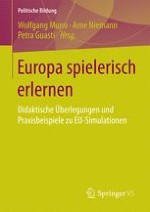2018 | OriginalPaper | Chapter
Der Einfluss von EU-Simulationen auf europäische Identität und politische Unterstützung der EU
Author : Paul Rünz
Published in: Europa spielerisch erlernen
Publisher: Springer Fachmedien Wiesbaden
Activate our intelligent search to find suitable subject content or patents.
Select sections of text to find matching patents with Artificial Intelligence. powered by
Select sections of text to find additional relevant content using AI-assisted search. powered by
